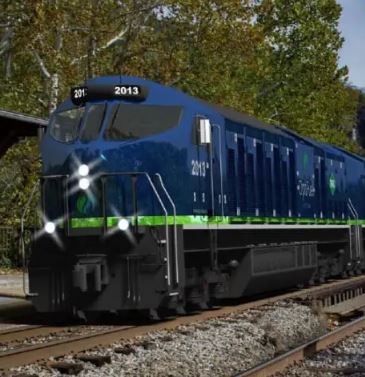
Two new awards from the Consolidated Rail Infrastructure and Safety Improvements (CRISI) Program will put new zero emission locomotives on the fast-track to production, officials said Friday.
More than $26 million in grants went to Colorado State University Pueblo and the University of Delaware to fast-track FRA Concurrence for OptiFuel TotalZero Diesel-RNG Dual Fuel Hybrid Switchers and Line Haul locomotive for 2026 and 2027, officials said. The concurrence will allow OptiFuel to deliver Diesel-RNG hybrid switcher locomotives in 2026, serving short line and transit railroads awarded 2024 CRISI grants, and those seeking to submit gran applications in 2025.
“We believe that the debate on the next generation power source for freight locomotives is over,” Scott Myers, OptiFuel’s president, said. “Replacing existing locomotives with battery electric, hydrogen or catenary power would cost Class 1 railroads several trillion dollars, while OptiFuel locomotives achieve the same goal at around 5 percent of that cost. To meet Class 1 SBTi targets of 100 percent NET-ZERO by 2050, a zero emission line haul locomotive must achieve FRA concurrence and be in production by 2030 to feasibly replace the 25,000 high-emission line haul locomotives reaching end-of-life within this timeframe.”
Myers said the locomotive is the only product to achieve FRA concurrence in time and that the company’s approach offers railroads not only emissions elimination, but low-risk, cost-effective solutions to achieve widespread adoption within the next five years.
The company plans to begin production of its Total-Zero 5000hp Diesel-RNG Dual Fuel Hybrid Line Haul locomotives after completion of FRA concurrence and achieving one million miles of reliability testing at the FRA’s Technology Transportation Center.
The awards announced Friday include $11.6 million for Colorado State which will provide a 35 percent match for a total of $18.4 million to validate the reliability, crashworthiness and FRA concurrence of OptiFuel’s RNG/Hydrogen Onboard Storage Modules for switchers and line haul alternative fueled locomotives. The University of Delaware will receive $14.4 million with a 20 percent match for a total of $18.1 million to fund long-term reliability testing for multiple line haul locomotives, which is expected to expand OptiFuel’s impact on the development of programs for the next generation of railroad workforce.